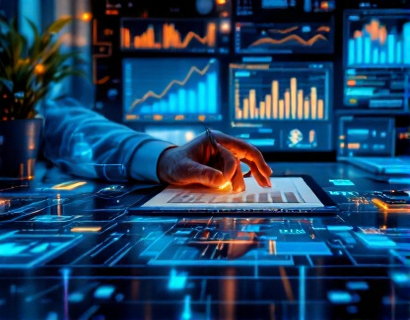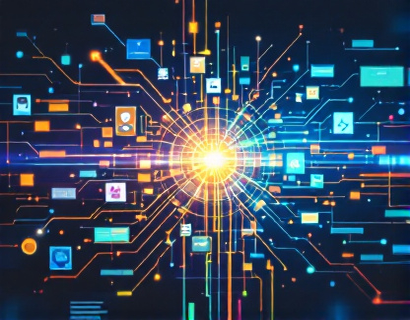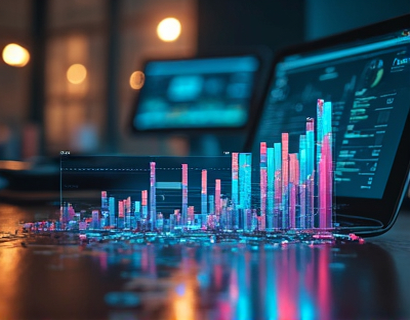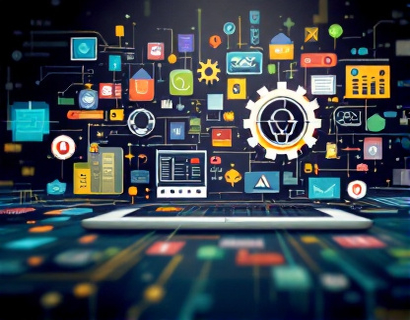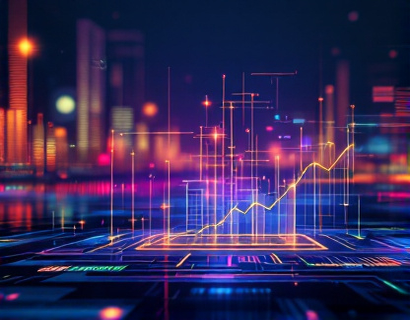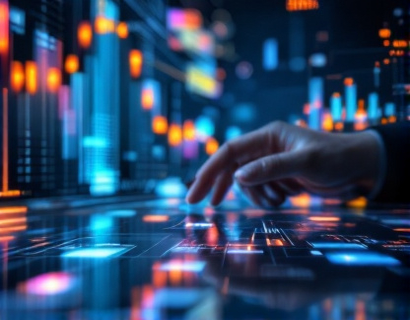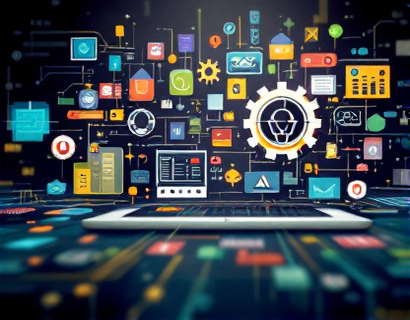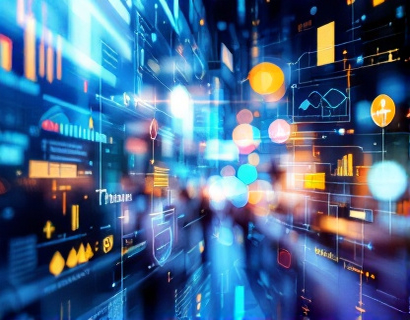AI and Crypto: Revolutionizing Finance and Technology with Next-Gen Innovations
The intersection of artificial intelligence (AI) and cryptocurrency is ushering in a new era of financial and technological innovation. This fusion is not only transforming traditional banking and investment paradigms but also creating novel digital solutions that enhance user experiences and redefine industry standards. As crypto enthusiasts and tech-savvy innovators continue to explore the potential of these technologies, it's crucial to understand how their combined power is reshaping the landscape of FinTech.
The integration of AI into cryptocurrency systems brings a level of sophistication and efficiency previously unimaginable. AI algorithms can analyze vast amounts of data in real-time, identifying patterns and making predictions that human analysts might miss. In the context of crypto, this means more accurate market predictions, optimized trading strategies, and enhanced security measures. For instance, AI-driven trading bots can execute trades at optimal times, minimizing human error and maximizing profits.
One of the most significant impacts of AI in the crypto space is in the realm of security. Cryptocurrencies, by their nature, are vulnerable to hacking and fraud. AI can detect unusual patterns in transactions and user behavior, flagging potential security threats before they become major issues. Machine learning models trained on historical data can predict and prevent cyber attacks, ensuring a safer environment for users. This is particularly crucial as the value of crypto assets continues to rise, making them a more attractive target for malicious actors.
Moreover, AI is revolutionizing the way crypto exchanges operate. Traditional exchanges often struggle with scalability and efficiency, leading to slow transaction times and high fees. AI-powered exchanges can process transactions faster and more cost-effectively by optimizing network traffic and resource allocation. These exchanges can also offer personalized user experiences, tailoring recommendations and services based on individual user behavior and preferences. This level of customization not only enhances user satisfaction but also increases platform engagement and loyalty.
Enhancing User Experiences Through AI and Crypto
The user experience in the crypto space is being dramatically improved through the integration of AI and blockchain technology. One key area is in customer support. AI chatbots and virtual assistants can provide instant, 24/7 support to users, answering common queries and guiding them through complex processes. These AI-driven tools can understand natural language, making interactions more intuitive and efficient. This not only reduces the workload on human support teams but also ensures that users receive timely and accurate assistance.
Another significant enhancement is in the area of identity verification and Know Your Customer (KYC) processes. Traditional KYC procedures can be cumbersome and time-consuming, often deterring new users from entering the crypto market. AI-powered solutions can streamline these processes by using advanced biometric recognition and machine learning to verify identities quickly and accurately. This not only improves the user experience but also helps comply with regulatory requirements more efficiently.
Furthermore, AI can enhance the overall usability of crypto wallets and wallet applications. By analyzing user behavior and transaction patterns, AI can offer personalized wallet settings, security recommendations, and even suggest optimal times for transactions to minimize fees. This level of personalization makes crypto more accessible and user-friendly, encouraging broader adoption.
Redefining Industry Standards with AI and Crypto
The combination of AI and crypto is not just about improving existing processes; it's about redefining industry standards and creating entirely new paradigms. One of the most promising areas is in decentralized finance (DeFi). DeFi platforms leverage blockchain technology to offer financial services without traditional intermediaries. AI can enhance DeFi by providing sophisticated risk assessment tools, automated portfolio management, and predictive analytics. These tools help users make more informed decisions and manage their crypto assets more effectively.
AI also plays a crucial role in the development of stablecoins, which are cryptocurrencies designed to maintain a stable value relative to fiat currencies or other assets. By using AI to analyze economic indicators, market trends, and other relevant data, developers can create more stable and reliable stablecoins. This stability is essential for the widespread adoption of crypto as a viable alternative to traditional currencies.
In the realm of smart contracts, AI can optimize the execution and management of these self-executing contracts. AI algorithms can monitor contract conditions in real-time, ensuring that all parties adhere to the agreed terms. This not only reduces the risk of disputes but also increases the efficiency and reliability of smart contracts. As more complex contracts are developed, the role of AI in managing and executing these contracts will become increasingly important.
Innovative Applications of AI and Crypto
The synergy between AI and crypto extends beyond traditional financial services to innovative applications across various industries. One such application is in supply chain management. By integrating AI with blockchain, companies can create transparent and tamper-proof supply chains. AI can analyze data from various points in the supply chain, predicting bottlenecks, optimizing logistics, and ensuring product authenticity. This not only improves operational efficiency but also builds trust with consumers who value transparency.
Another innovative application is in the healthcare sector. AI-driven analytics can process large datasets from medical records, research studies, and patient feedback to identify trends and insights. When combined with crypto, this can lead to secure and decentralized health data management systems. Patients can have control over their medical data, sharing it securely with healthcare providers and researchers while ensuring privacy and compliance with regulations.
The real estate industry is also seeing transformative changes through AI and crypto. Blockchain-based platforms can streamline property transactions, reducing the need for intermediaries and lowering costs. AI can analyze market data to predict property values, identify investment opportunities, and optimize property management. This combination not only makes real estate more accessible but also more efficient and transparent.
Challenges and Considerations
While the potential of AI and crypto is vast, there are several challenges and considerations that must be addressed. One of the primary concerns is regulatory compliance. As governments around the world begin to recognize and regulate crypto assets, ensuring that AI-driven solutions comply with these regulations is crucial. This requires a deep understanding of both AI and regulatory frameworks, as well as proactive engagement with policymakers.
Another challenge is the technical complexity involved in integrating AI with blockchain technology. Developing robust and scalable solutions that can handle the high transaction volumes and security requirements of crypto platforms is no small feat. Continuous research and development, along with collaboration between AI experts and blockchain developers, are essential to overcome these technical hurdles.
Privacy is also a significant concern. While AI can enhance security, it can also raise questions about data privacy and the ethical use of personal information. Ensuring that AI systems are designed with strong privacy protections and that users have control over their data is vital for building trust and fostering widespread adoption.
Future Prospects
Looking ahead, the future of AI and crypto is bright, with numerous opportunities for growth and innovation. As AI technology continues to advance, we can expect even more sophisticated applications in the crypto space. For instance, the development of AI-powered decentralized autonomous organizations (DAOs) could redefine governance and decision-making in crypto communities. These DAOs can use AI to analyze member preferences, optimize resource allocation, and ensure transparent and democratic processes.
The integration of AI with other emerging technologies, such as the Internet of Things (IoT) and 5G networks, will further enhance the capabilities of crypto systems. IoT devices can generate vast amounts of data that AI can analyze to provide real-time insights and automated actions. 5G networks will enable faster and more reliable data transmission, making AI-driven crypto applications more responsive and efficient.
In conclusion, the fusion of AI and crypto is revolutionizing finance and technology, creating innovative solutions that enhance user experiences and redefine industry standards. As this synergy continues to evolve, it will open up new possibilities for growth, efficiency, and transparency across various sectors. For those interested in the future of finance and technology, understanding the potential of AI and crypto is essential.







